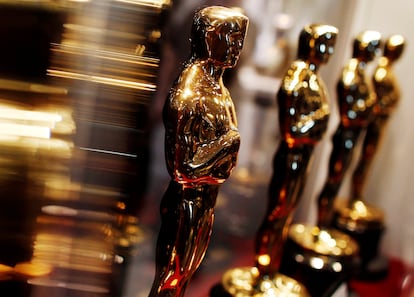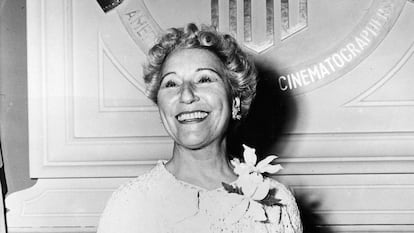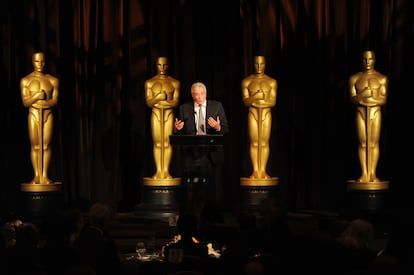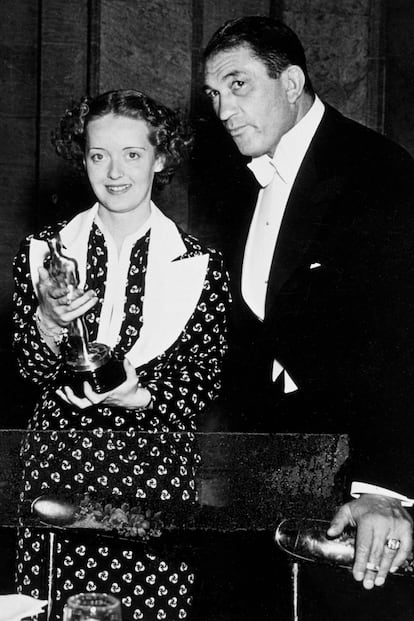New book reveals the true story of how the Oscars got their name
A forthcoming, highly researched account by a former Hollywood Academy executive puts a long-running controversy to bed, and confirms that it was not actress Bette Davis who came up with the nickname


The most coveted trophy in cinema is called the Academy of Motion Picture Arts and Sciences Award, but it was dubbed the Oscar several years after it was first presented on May 16, 1929, at the Roosevelt Hotel, just a block away from the gala’s current venue, the Dolby Theater.
The Hollywood Academy has it all on record. The nickname, the official name – the whole shebang. But where does the nickname come from? Well, from a “straight and tall” Norwegian sailor, in fact. A book on the first 50 years of the Academy, to be published in the US in October, mentions the origins of the name and singles out Academy assistant, Eleanore Lilleberg, as the creator of the alias.
Until now, it was commonly believed that Margaret Herrick had given the name to the award, which is not, in fact, solid gold, but britannia – an alloy of copper, tin and antimony – bathed in gold. This story had it that, in 1931, Herrick, who was then Margaret Gledhill, joined the Academy’s library and on her first day of work came across a statuette, of which she said, “It reminds me of my uncle Oscar.” According to the 1947/1948 Hollywood Academy Almanac, a journalist got wind of the anecdote and put it in print the following day.
In 1943, Herrick became executive director of the Academy and was the first to negotiate with a television network for the live broadcast of the gala in 1953. This gave the Academy financial independence, freeing it from reliance on membership fees, and allowed it to expand its educational programs and cultural activities.

But in the forthcoming book The Academy and the Award, due out in October, author Bruce Davis tells it differently and he should know, as for 22 years, he was the Academy’s executive director until his retirement in 2011. In other words, he has had access to the archives, which is what he has devoted himself to since leaving office. Davis is not just any executive either: some time ago, he came up with the idea of investing some of the Academy’s savings in the museum that has now become one of the jewels in its crown.
According to the website Deadline, which has had access to the 521-page tome, Davis’ research has been thorough. Regarding Herrick’s story, he found a 1938 Los Angeles Examiner report in which Herrick offered a different version of the tale, namely that she and her first husband, Donald Gledhill, used to have a private joke between them that went, “How’s your Uncle Oscar?”
In a bid to get to the bottom of the matter, Davis then brings in the 1970 memoirs of columnist Sidney Skolsky, Don’t Get Me Wrong – I Love Hollywood. Skolsky also took credit for the name, recalling that, under deadline pressure in 1934, he used it in mocking tribute to Vaudeville comedians who liked to say to the conductor of the orchestra, “Will you have a cigar, Oscar?”

However, on March 16, 1934, Skolsky himself wrote in the New York Daily News: “Among the profession, statuettes are called Oscars.” So, both Skolsky’s initial claim and Herrick’s claim were unseated, leaving that of actress Bette Davis.
In January 1941, Bette Davis became the first woman to preside over the Hollywood Academy, a position she resigned from a few months later after a stand-off between her and the board of directors. However, in her memoirs The Lonely Life, published in 1962, she maintained that she was the one who thought of the epithet when holding her first Oscar for Dangerous in 1936: “His back view was the spit of my husband’s. Since the ‘O’ in Harmon O. Nelson stood for Oscar, Oscar it has been ever since,” she wrote. When it was pointed out that the term had already been in use for two years by then, the actress recanted.
So, Bruce Davis kept digging. And he found that the Oscars were actually probably named by Eleanore Lilleberg, a secretary and office assistant in the early days of the Academy who was in charge of looking after the statuettes in the run-up to the ceremonies. She had been previously mooted as responsible for the name Oscar, though not how it came about.

But in a small museum in Green Valley, California, dedicated to Lilleberg and her gemologist brother Einar, Davis found Einar’s unfinished memoirs in which he explains that it was Eleanore who named the award Oscar, after a Navy veteran from Norway, the Lilleberg family’s country of origin. Together, they had met this sailor in Chicago and noted that, like the statuette, he “stood straight and tall.” A 1944 newspaper interview with a colleague and an oral account back up this theory.
Which puts this particular mystery to rest, though there are plenty more Oscar secrets in the book...
Tu suscripción se está usando en otro dispositivo
¿Quieres añadir otro usuario a tu suscripción?
Si continúas leyendo en este dispositivo, no se podrá leer en el otro.
FlechaTu suscripción se está usando en otro dispositivo y solo puedes acceder a EL PAÍS desde un dispositivo a la vez.
Si quieres compartir tu cuenta, cambia tu suscripción a la modalidad Premium, así podrás añadir otro usuario. Cada uno accederá con su propia cuenta de email, lo que os permitirá personalizar vuestra experiencia en EL PAÍS.
¿Tienes una suscripción de empresa? Accede aquí para contratar más cuentas.
En el caso de no saber quién está usando tu cuenta, te recomendamos cambiar tu contraseña aquí.
Si decides continuar compartiendo tu cuenta, este mensaje se mostrará en tu dispositivo y en el de la otra persona que está usando tu cuenta de forma indefinida, afectando a tu experiencia de lectura. Puedes consultar aquí los términos y condiciones de la suscripción digital.








































